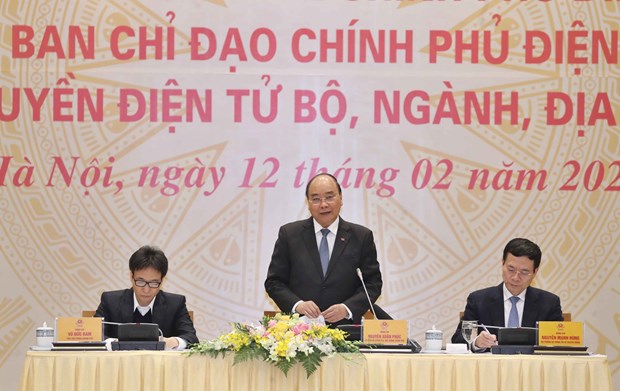
The PM chaired a teleconference in Hanoi on February 12 between the National Committee on e-Government and the steering boards for e-Government and e-administration building of ministries, sectors and localities.
Minister, Chairman of the Government Office Mai Tien Dung reported positive outcomes in administrative reforms and business climate improvement associated with e-Government building last year.
Fifty-five of the 63 provincial-level localities have set up public administrative service centres, 95.8 percent of procedures have been handled on schedule, and 3,451 of the 6,191 business conditions set up by ministries and sectors have been eliminated.
Meanwhile, 6,776 of the 9,926 lines of goods subject to specialised inspection, as well as 30 of the 120 administrative procedures related to specialised inspection, have been removed.
The reduction and simplification have helped society save more than 18 million workdays or over 6.3 trillion VND (271 million USD) each year, Dung noted.
From December 9, 2019, when the PM launched the National Public Service Portal, to February 9, 2020, more than 44,200 accounts were opened on this portal. The website recorded over 13.4 million visits, had 6,900 online dossiers handled successfully, and dealt with 4,150 opinions of people and businesses. About 3,900 calls to the switchboard 18001096 were solved.
So far, nine of the 22 ministries and ministry-level agencies and all the 63 provincial-level localities have been connected with the National Public Service Portal, he said.
Minister of Information and Communications Nguyen Manh Hung said all ministries, sectors and localities have been connected with the national e-document exchange platform, helping raise the rate of e-documents exchanged online from 72 percent in 2018 to 86.5 percent in 2019, very close to the target of 20 percent for 2020.
The rate of online public services provided at level 4 – the highest level – surged from 4.55 percent in 2018 to 10.76 percent last year, the official added.
Applauding the strides, PM Phuc also cited the UN’s E-Government Development Index 2018 as showing that Vietnam just ranked 88th among 193 countries and sixth in the Association of Southeast Asian Nations (ASEAN), which is still low compared to the world and ASEAN’s average.
He attributed the modest ranking partly to the weak performance in protecting personal data and the lack of determination in e-Government building in some places. He also pointed to incomplete database, problematic technical infrastructure, the shortage of resources for e-Government building, and limited budget for the work in many localities.
For 2020, the leader requested all resources to be mobilised to fulfill the goals set for the year, especially raising the rate of level-4 online public services to 30 percent.
He asked ministries, sectors and localities to build a strategy on e-Government for 2021-2025 with a vision to 2030; perfect relevant regulations such as issuing decrees on data management, connection and sharing, online identification and verification, and personal information protection, and amending laws on e-transactions and archives; and complete the basic factors of an e-Government.
PM Phuc also assigned the Ministry of Information and Communications to develop a single mobile app via which people and businesses can access all services of the e-Government.


